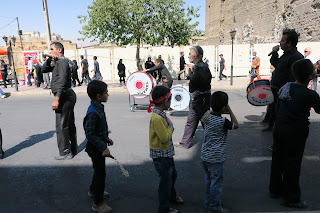Ashura (Arabic: عَاشُورَاء, romanized: ʿĀshūrāʾ), also known as Yawm Ashura (Arabic: يَوْم عَاشُورَاء), is the tenth day of Muharram, the first month in the Islamic calendar. It marks the day that Husayn ibn Ali, the grandson of the Islamic prophet Muhammad, was martyred in the Battle of Karbala. Ashura is a major holiday and occasion for pilgrimage in Shia Islam, as well as a recommended but non-obligatory day of fasting in Sunni Islam.
Ashura marks the climax of the Remembrance of Muharram, the annual commemoration of the death of Husayn and his family and supporters at the Battle of Karbala on 10 Muharram in the year 61 AH (in AHt: 10 October 680 CE). Mourning for the incident began almost immediately after the battle. Popular elegies were written by poets to commemorate the Battle of Karbala during the Umayyad and Abbasid era, and the earliest public mourning rituals occurred in 963 CE during the Buyid dynasty. In Afghanistan, Iran, Iraq, Lebanon, Bahrain and Pakistan Ashura has become a national holiday, and many ethnic and religious communities participate in it.
For Sunni Muslims, Ashura also marks the day that Moses and the Israelites were saved from Pharaoh by God creating a path in the Sea or Noah leaving the Ark.
Ashura marks the climax of the Remembrance of Muharram, the annual commemoration of the death of Husayn and his family and supporters at the Battle of Karbala on 10 Muharram in the year 61 AH (in AHt: 10 October 680 CE). Mourning for the incident began almost immediately after the battle. Popular elegies were written by poets to commemorate the Battle of Karbala during the Umayyad and Abbasid era, and the earliest public mourning rituals occurred in 963 CE during the Buyid dynasty. In Afghanistan, Iran, Iraq, Lebanon, Bahrain and Pakistan Ashura has become a national holiday, and many ethnic and religious communities participate in it.
For Sunni Muslims, Ashura also marks the day that Moses and the Israelites were saved from Pharaoh by God creating a path in the Sea or Noah leaving the Ark.
Source: Ashura - Wikipedia







































































